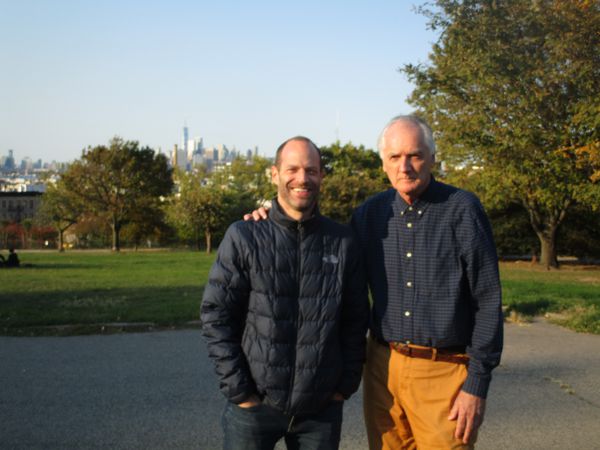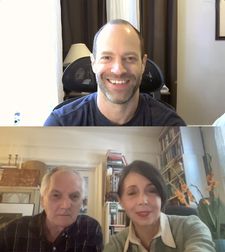Carl Theodor Dreyer’s 1928 silent film La Passion De Jeanne d'Arc (The Passion Of Joan Of Arc, co-written with Joseph Delteil), shot by Rudolph Maté and starring Renée Falconetti with Eugène Silvai, André Berley, Maurice Schutz, Antonin Artaud, Michel Simon, Jean d’Yd, and Louis Ravet is a cinematic masterpiece, based on transcripts of Joan of Arc’s actual trial. With a fascinating history of lost prints and numerous edits, the film still speaks to us about faith, calling, and the divine, as they clash with deception, corruption, and power.
French director Bruno Dumont in recent years took on Jeanne d’ Arc’s childhood and life story in two extraordinary musical films, Jeannette, L'Enfance De Jeanne D’Arc (Jeannette, The Childhood Of Joan Of Arc) and Jeannette (Joan of Arc), inspired by the writings of Charles Péguy. “Cinema is a place of belief,” Dumont told me in 2018. Dreyer’s work is the best example of this incarnation of religion in cinema.
The sold-out 30th anniversary performance of Richard Einhorn’s Voices Of Light oratorio, paired with The Passion Of Joan Of Arc, will be presented by The New York Choral Society in partnership with the Mannes Orchestra and featured soloists, The Polyphonists (soprano Amy Broadbent, mezzo-soprano Sylvia Leith, tenor Matthew Hill, and bass-baritone Edmund Milly) on November 1 at Lincoln Center’s Alice Tully Hall.
From Brooklyn, Craig Schoenbaum joined music producer and 99 Records founder Ed Bahlman on Zoom for a conversation on The New York Choral Society Presents: Voices Of Light / The Passion Of Joan Of Arc.
Craig Schoenbaum: What's up, guys? Howdy.
Ed Bahlman: Hey? The man!
Anne-Katrin Titze: Hi, neighbour!
CS: Neighbours, do you hear me rehearsing for this thing yet? I'm trying not to blow out the building with these rehearsal tapes that I'm doing for this piece. It's pretty epic!
EB: Well, I saw this work, Richard Einhorn's oratorio [Voices of Light] in 1995.
CS: Oh, wow! Cool!
EB: On October 25, at the Brooklyn Academy of Music Opera House.
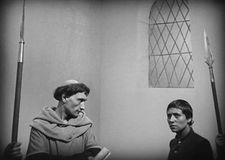 |
| Antonin Artaud as Jean Massieu with Jeanne (Falconetti) |
CS: Okay, that's really cool, because I've only been in this chorus for less than a year. But the material that they're choosing is like super cool and it's not widely done or often done. It's sort of like a thing when it happens, you know what I'm saying? The thing we did at Alice Tully Hall in the winter last year, Charles Ives! Symphony No. 4 it was and it just hadn't been done in New York for a number of years, maybe, since the premiere.
So it was the first time that his Symphony No. 4 had been done. It's dissonant and it's just really strange. Five orchestras on stage battling each other. It's really really weird stuff. So I'm like, what am I doing? The chorus was in the balcony, singing things in a different key, different time signatures, different conductor.
AKT: For the Dreyer, how do they prepare you? Did they say: Okay, now everybody gets a link and watches the film?
CS: It's interesting, they have the music linked up. So there's a link, it might even be on YouTube, the version that they were doing for timing. But yes, that's what I'm using to rehearse with, because there's a lot of music, but how it's lining up with the actual movie is important.
EB: What's the runtime of the film that you're using?
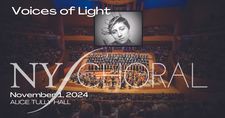 |
| The New York Choral Society Presents: Voices Of Light / The Passion Of Joan Of Arc |
CS: It’s 82 minutes with the performance at 90 minutes, it's intense. The movie is with subtitles. But it just works. So it's such a cool thing to see with the music, because it's like Whoa!
EB: Where are you rehearsing?
CS: We rehearse on 83rd Street, Upper West Side. It's a rectory. It's between Columbus Ave and Amsterdam. That's where we practice every week, every Tuesday night, this beautiful huge space in the basement, based in a sublevel of the building, but it's built for a choir, or maybe service. It might be built for some sort of service, but they let us rehearse there every Tuesday night from 7 pm to 9 30 pm. It's great.
AKT: You rehearse with the film?
CS: No, there's one other piece that we're doing in conjunction with this in December somewhere else [A Very Merry Brooklyn on December 14 at St. Ann & the Holy Trinity]. So we're not practicing this every night, and sometimes they split it up. But we haven't actually done it with the film yet. The Music Director, he’s great. He's actually interviewing Einhorn. Coming up, he’s having a one-on-one interview with him.
EB: What's the name of the director?
![Ed Bahlman: “I saw this work, Richard Einhorn's oratorio [Voices of Light] in 1995 … at the Brooklyn Academy of Music Opera House.”](/images/newsite/The_Passion_of_Joan_of_Arc_Voices_of_Light_1995_225.jpg) |
| Ed Bahlman: “I saw this work, Richard Einhorn's oratorio [Voices of Light] in 1995 … at the Brooklyn Academy of Music Opera House.” |
CS: David Hayes, he conducts a bunch of stuff. I think he's doing [something] with the Philharmonic in Philly right now as well as a number of teaching positions. So it's cool to be with a teacher that's very serious but not too crazy. You want to be prepared, you want to go there prepared when you're doing it with this guy. It's cool. You feel like, okay, he's not going to waste your time. We're not going to waste his time kind of thing. It's a big chorus, like 140, it's a large chorus.
EB: Are you a countertenor?
CS: No, I'm tenor 1. I probably could mess around with some of that countertenor stuff. But no, we're doing upper tenor stuff on my end, which is cool because it's always a sought-after position. It seems the tenors are always harder to find, which is great. It's been a challenge. The piece that we did last year. [Gian Carlo] Menotti’s The Unicorn, the Gorgon, and the Manticore was really challenging. It would have been challenging had I been doing this for five or ten years. Everything after that is seeming like a little bit of a breeze, to be honest with you.
EB: What did you sing for your audition?
CS: For this I auditioned with O Holy Night, Nat King Cole, you know that Christmas song.
EB: Oh, yeah!
CS: It was right after Christmas, and I thought, okay, ’tis the season, let me try something like that. It's pretty, you could see a choir behind it. I think I got in on talent.
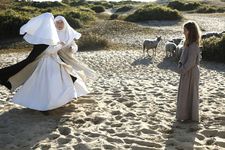 |
| Aline Charles, Elise Charles and Lise Leplat Prudhomme in Bruno Dumont’s Jeannette, L'Enfance De Jeanne D’Arc |
EB: You're in that Nat King Cole range, your voice?
CS: Yeah, it was there.
AKT: The Passion Of Joan Of Arc, the Dreyer film is remarkable. It is such an incredible work of art. Joan of Arc, seems to be back in style a little bit in the past few years. There were two movies by Bruno Dumont, the French filmmaker. I don't know if you've ever seen them. They are very unusual musical versions on the theme.
CS: Yeah, the thing we did last spring, too. For this chorus had a Joan of Arc twist to it as well. They just had monologues in-between the music. It was really strange that again, it's sort of coming around to that topic. So yeah, it is kind of strange how things just become relevant again in those circles.
AKT: Her case, conviction, martyrdom? I don't know what it is.
CS: It's an election year. Yeah.
EB: Are you working with the orchestra each time you rehearse?
CS: Nope, those come towards the end. We'll probably get about six, seven hours total with them over the next few weeks. And it's great. I love that part of it. The cool thing about it is that there's one right way to play it. So it's not the slight interpretations. You listen to something like that that's recorded. It's going to sound exactly the same. If the person's doing it right. So it's great when you just get to it, live.
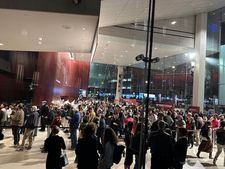 |
| Lincoln Center’s Alice Tully Hall Photo: Anne Katrin Titze |
And you know what's coming next. You've heard the context around the parts that you sing. I don't just listen to the parts that we sing to, I usually listen to the entire thing because you want to know where you sit in the context of the show, too, and not be surprised. He [David Hayes] even told us, make sure you familiarise yourself with the film and how the music sits, too, because there are gaps. If you don't watch the movie before the show, he's like, you will be doing this the whole time, like looking up at the screen. And he's like, we don't want you guys doing that because it's really compelling. It's a really cool thing to watch.
EB: Are you going to be in the balcony again?
CS: I actually think we're going to be on stage this time, which is great. The reason we were in the balcony before for the Ives was because there wasn't any room. There was literally like three orchestras on stage. It was so choked up. There was no space for a choir.
AKT: Many people believe that silent movies were shown silent, but they never were. Most of the black and white movies, the early ones, weren't even black and white, they were hand-colourised, and they had live music.
CS: Right, right. They had a real band playing at the theatre itself.
EB: Yes. Also with Dreyer, they lost the master print [in a fire at UFA studios in Berlin] when he had finished the editing.
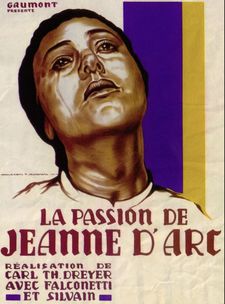 |
| La Passion De Jeanne d'Arc poster |
CS: Oh, wow!
EB: For The Passion Of Joan Of Arc he had to use pieces of the film that he had cut out to put it back together again [Known as the “second version” until in 1981 a copy of the long lost original version was found by a janitor working in a mental institution in Norway].
CS: That's wild. That's unbelievable.
AKT: Falconetti and Artaud and everybody were prohibited from wearing any makeup. He wanted the natural faces and the shadows, and the film itself has such a fascinating story. Irving Thalberg wanted to do a remake with Greta Garbo, which never happened.
EB: The backstory was that Dreyer wouldn't come to America to work with an American studio. He refused to get involved with that.
CS: Wow! I did not know that, that's so crazy about the scraps, and that they actually luckily kept them handy. They didn't toss them out or anything like that. But wow!
AKT: I also love Day Of Wrath, which is another Dreyer movie, that is fantastic. After your performance, perhaps, you can indulge!
CS: Yeah, absolutely absolutely. Thank you, guys!








